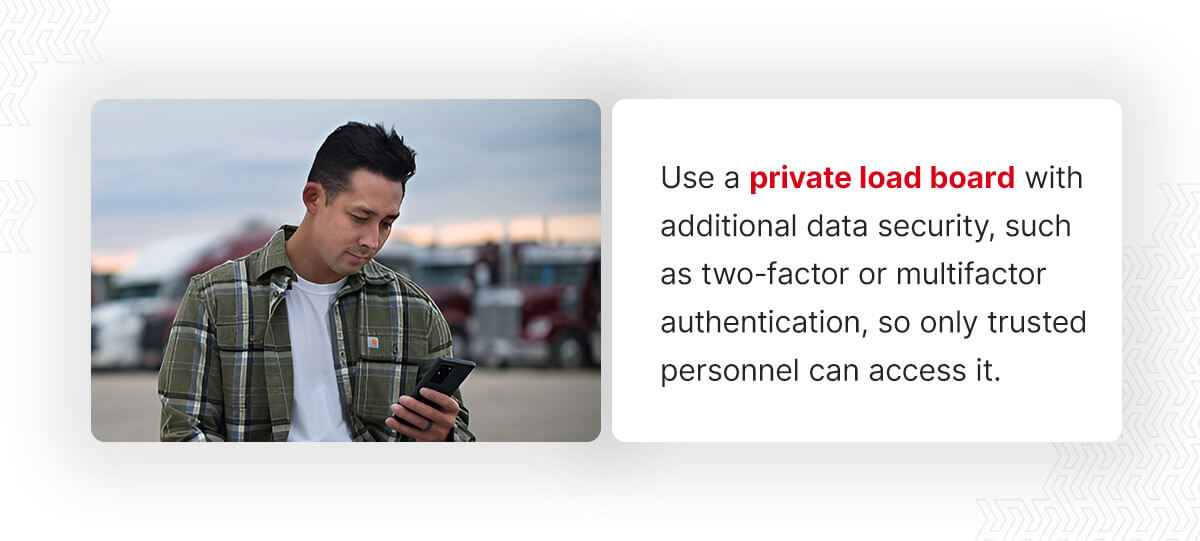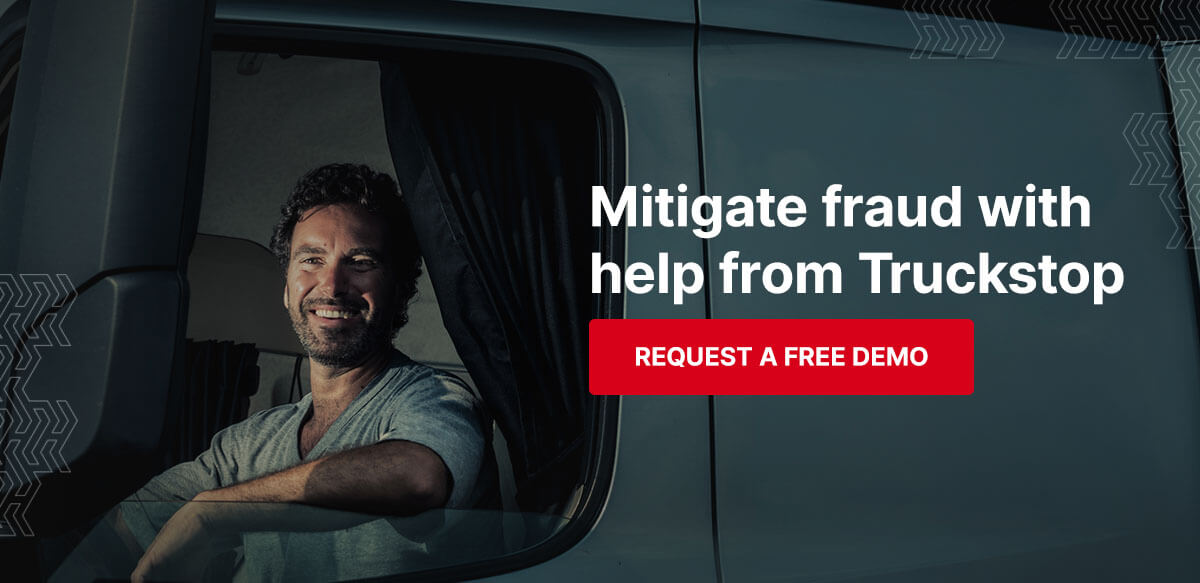Freight Fraud: How Brokers Can Avoid This Common Threat

Vetting Carriers is Easier
With Risk Factors
Start a FREE 14-day trial.
Freight fraud and cargo theft have become more common over the past few years, and most brokers have felt the impact in one way or another. Scammers are getting more sophisticated, targeting brokers and cargo in ways that are harder to spot and more expensive to recover from. According to the National Insurance Crime Bureau, cargo theft incidents are expected to rise 22% by the end of 2025. They estimate the average value of each individual theft to be over $202,000.
Below are the most common freight fraud threats, what they mean for your business, and steps you can take to reduce risk.
Opportunities for scammers in freight
Freight brokers might be tempted to assume that any carrier listed on the Federal Motor Carrier Safety Administration (FMCSA) registration system is legitimate. However, the FMCSA has acknowledged that its registration system is outdated and needs an overhaul to control fraud.
While the FMCSA plans to improve processes for verifying identities and businesses to keep “bad actors” out of the system, brokers can’t solely rely on that. Until changes are implemented, brokers will need to be vigilant to protect their interests.
“Security begins with identity, and operating authority should too. Before any company moves freight, there must be confidence in who’s actually behind the authority, not just a name in a database. When identity isn’t verified, the entire system relies on trust alone, and that’s where fraud takes root,” said Dale Prax, CEO of Freight Validate and Truckstop Fraud Advisor.
Types of freight fraud
Here are the top threats freight brokers should know.
Cargo theft
Cargo theft is nothing new, but the tactics thieves use to steal cargo are becoming more strategic. Thieves often circumvent the carrier vetting process by taking on the identity of a legitimate trucker or contacting brokers directly with available capacity. Brokers are typically unaware they’ve been scammed until their customer tells them the cargo hasn’t been delivered. To make matters worse, cargo theft continues to be highly underreported, which only enables criminal activity to continue.
These big fraudulent hits can damage a broker’s business. Criminals carry out their activities by targeting areas of weakness within the supply chain, including brokers, drivers, shippers, and warehouse facilities.
Brokers should take precautions to prevent theft, even if it slows down processes.
Double brokering
Double brokering happens when a carrier accepts a load from a broker and then illegally transfers, or re-brokers, the load to another carrier to complete the haul without notifying the original broker or shipper.
This can result in the cargo being transported by a carrier that lacks proper authority or insurance, or it may not be delivered to its destination at all. It also voids the shipper’s agreement, which can place any party involved at risk of financial loss, insurance liability, and reputational damage. It can lead to permanent loss of FMCSA authority.
Brokers might not be made aware of a double broker situation until there’s a big problem, and tracking down the guilty party can be difficult. In today’s down market, we’re likely to see fraud issues like double brokering increase.
Identity theft
Identity theft can include unauthorized load brokering or impersonation using U.S. Department of Transportation (USDOT) numbers. This type of fraud can be challenging to detect. Criminals often intercept sensitive data transmitted across digital channels and then use it to impersonate the actual carrier. They might use phishing scams to trick brokers into sharing sensitive information, then act as the broker and hire a trucking company, defrauding the carrier.
How to prevent freight fraud and protect your business
Here are several ways to avoid freight fraud or fraudulent loads and protect your business.
1. Screen all carriers
To prevent cargo theft and fraud, you’ll need to screen every employee involved in the supply chain:
- Conduct a background check: Thoroughly vet every carrier, every time. Conduct a background check to make sure the carrier is who they say they are. Confirm the carrier’s phone number and call the carrier directly to verify accuracy before booking a load.
- Verify the carrier’s authority: Confirm the carrier’s authority and DOT number. Use additional vetting tools, such as Truckstop’s Risk Management Information System (RMIS) and Risk Factors. Check that the carrier is licensed to transport specific types of freight. Make sure the email address matches what’s listed on the carrier’s registered authority.
- Confirm insurance coverage: Double-check for insurance coverage and get a copy of the insurance certificate.
You should also ask questions if something looks suspicious, like a driver using a day cab for a three-day haul.
2. Improve freight visibility
One of the strongest ways to avoid cargo theft is to improve the visibility of your freight. You can use electronic logging devices (ELDs) or GPS to monitor your freight’s location in real time. It’s also important to keep records of the truck, including its DOT number and VIN, along with photos.
3. Plan routes to avoid high-risk areas
Plan your routes to avoid high-risk areas where theft could occur. If high-risk routes are unavoidable, instruct the driver to stop for fuel outside of high-risk zones to avoid theft. Use locks as an additional security hurdle for thieves.
4. Implement cybersecurity measures
Freight broker security measures are essential in preventing theft. Use a private load board with additional data security, such as two-factor or multifactor authentication, so only trusted personnel can access it.

The same goes for preventing identity theft. You can avoid it by improving the security of digital transactions. Use strong passwords and multifactor authentication for email and other platforms that contain sensitive information.
Keep in mind that “deep fake” technology makes it easy for anyone to impersonate the voice of someone you know. Added security layers like RMIS alert you to any phone calls made via Voice over Internet Protocol (VoIP). You can proceed with caution and be aware of potentially fraudulent activity.
5. Build trusting relationships
Working with carriers you know and trust decreases the risk of fraud, so building solid relationships is crucial. Create open and clear communication that benefits both parties. Transparency creates trust and helps you create a network of reliable carriers you can count on.
6. Train your employees
It’s critical to train your employees on the signs of fraud and cargo theft. Provide security training for all employees, and educate drivers on how to respond to and report theft.
7. Implement process controls
Process controls provide an extra barrier of protection from fraud and scams by making sure every transaction is verified and monitored. Types of controls can include:
- Payment holds: Hold payments until all delivery documentation is verified and the load is confirmed as delivered to the correct party. You could also use escrow or delayed payment systems for any new or unvetted carriers.
- Documentation checks: Require only original, unaltered documents like bills of lading or insurance certificates. Cross-check the carrier information, like DOT numbers, against official databases like FMCSA.
- Regular audits: Periodically review your carrier onboarding, payment processes, and transaction records. Look for unusual payment patterns, duplicate invoices, or changes in carrier information.
8. Use onboarding software tools
Properly onboarding and monitoring carriers with software tools can help keep you one step ahead of fraudsters. Bad actors can be tricky, so take time to dig into details such as credit history, tenure, inspection records, and CSA scores (compliance, safety, accountability).
9. Properly respond to any incident
If you suspect or detect fraud, you’ll need to act quickly to stop the issue from growing:
- Stop all payments related to a suspicious transaction.
- Secure any relevant documentation and digital records.
- If applicable, let your internal fraud or compliance team know.
- Let all affected parties know about the situation.
- Report the fraud to the relevant authorities, such as the FBI’s Internet Crime Complaint Center for cyber-related fraud.
- Review and strengthen your process controls to prevent fraud in the future.
How Truckstop is mitigating freight fraud risks
Truckstop is one of the safest freight marketplaces, offering three layers of fraud mitigation:
- Comprehensive broker and shipper verification
- Real-time fraud response
- Integrated factoring services
With an in-house team dedicated to monitoring fraud and mitigating scams like double brokering, Truckstop helps ensure carriers and brokers operate in a more secure environment. Stay protected with Truckstop’s advanced vetting, authentication, and fraud mitigation tools as your first line of defense.

Mitigate fraud with help from Truckstop.com
It’s crucial to take preventive measures to safeguard your assets, reputation, and integrity from falling prey to freight fraud. Knowing the tactics criminals use and taking time for due diligence can help you avoid freight fraud. And remember, trust your instinct if something looks suspicious.
Truckstop RMIS Carrier Onboarding and Monitoring helps you accurately qualify carriers to help minimize fraudulent activity. Receive daily status updates and carrier directory sourcing tools to save you time and protect your business.
Get helpful content delivered to your inbox.
Sign up today.
Find high-quality loads fast, get higher rates on every haul, and access tools that make your job easier at every turn.






